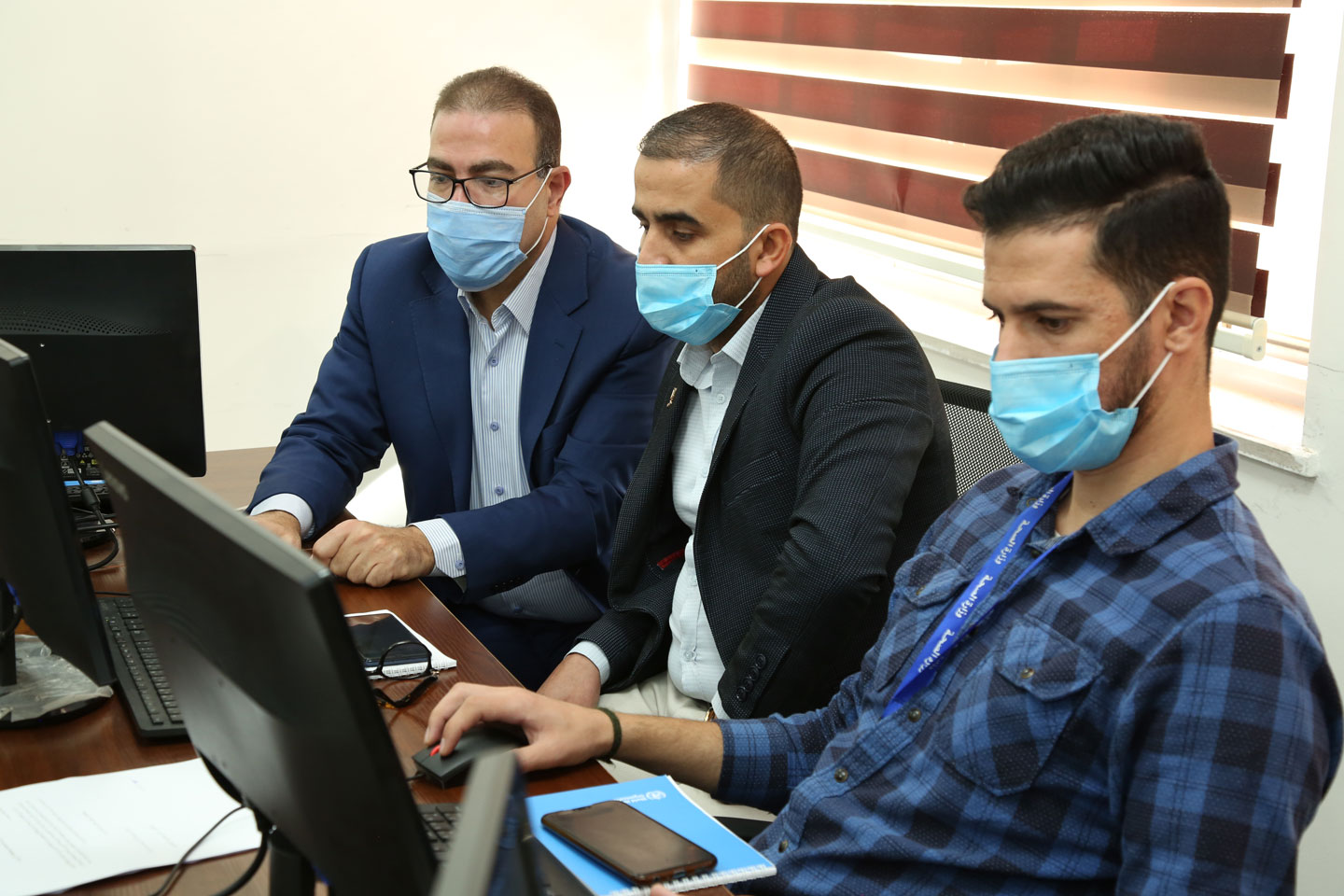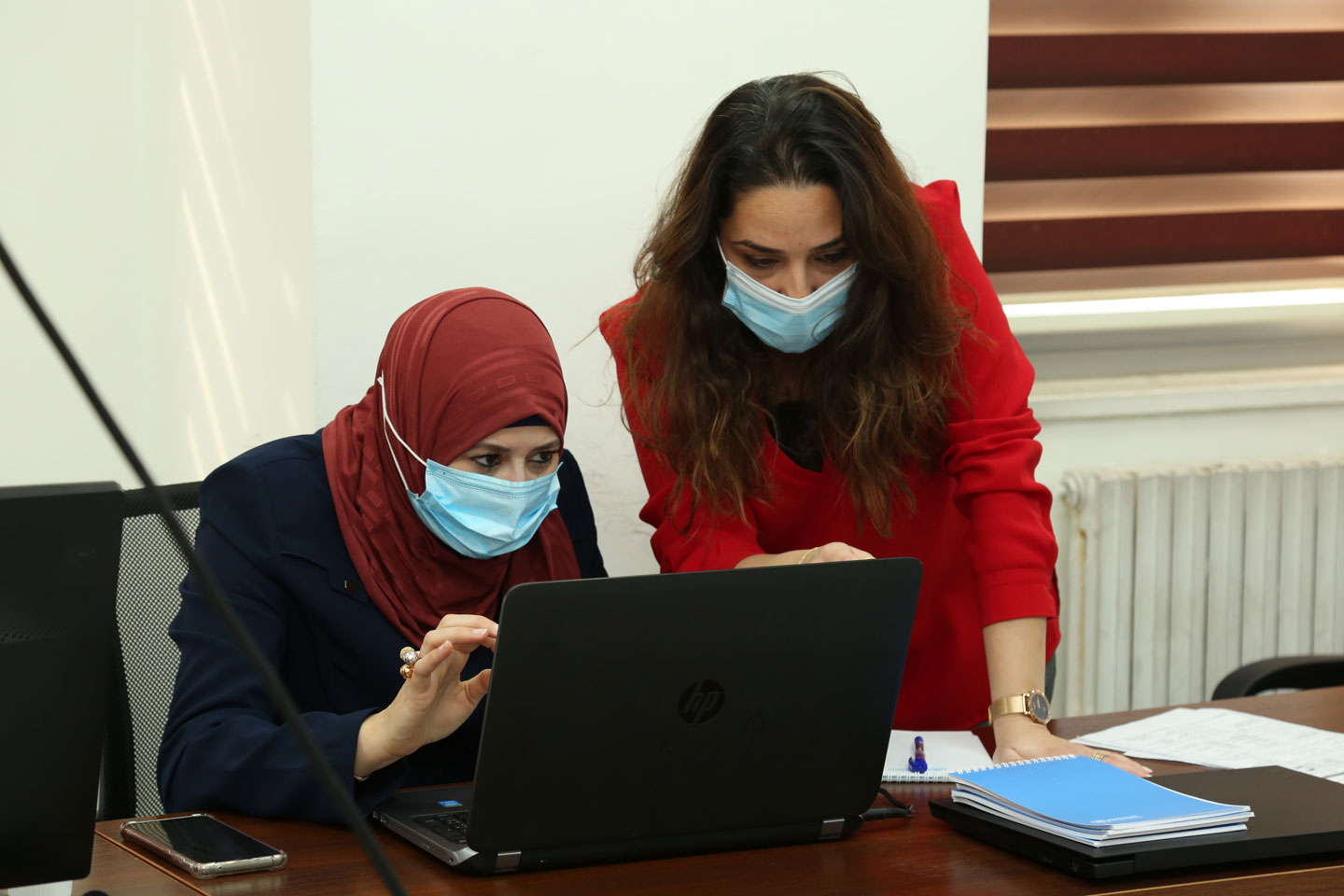 During the workshop, participants were able to review and analyse national sentinel surveillance system. Photo: WHOCairo, 4 November 2021 – Detecting and responding early to influenza and other emerging respiratory disease outbreaks can be achieved in Jordan through improved sentinel surveillance systems with proper data collection and analysis and the better use of data for public health actions.
During the workshop, participants were able to review and analyse national sentinel surveillance system. Photo: WHOCairo, 4 November 2021 – Detecting and responding early to influenza and other emerging respiratory disease outbreaks can be achieved in Jordan through improved sentinel surveillance systems with proper data collection and analysis and the better use of data for public health actions.
This was the main outcome of a workshop that was organized jointly by the Ministry of Health and WHO using the Pandemic Influenza Severity Assessment (PISA) tool. The participants of the workshop that took place between 26 and 28 October in Amman, Jordan included 20 health workers specialized in data management, public health, administration, disease control and prevention, and health disaster management from the department of communicable diseases and the national influenza centre in Jordan.
PISA activities fall under the Pandemic Influenza Preparedness (PIP) framework, through which WHO works with ministries of health to enhance national influenza surveillance capacities and strengthen influenza pandemic response systems. This collaboration between WHO and Member States enables countries to determine influenza incidence, assess severity and identify circulating influenza types, subtypes and lineages.
During the workshop, participants were able to review and analyse national sentinel surveillance system by discussing the number of sites, selection criteria, sampling methodology, specimen transportation, data flow, data management, feedback of results and the production of bulletins.
Participants learned how to evaluate the quality of influenza data, clean data and perform and interpret descriptive analyses to produce weekly bulletins. They were also trained on how to calculate PISA indicators, calculate thresholds for each parameter and interpret outputs using available PISA tools. The use of WHO’s global and regional influenza reporting platforms were also presented, including FluNet and EMFLU.
Gaps and challenges related to the quality and management of the data were addressed during the workshop, and some actions were agreed to be taken to improve surveillance activities, including detecting, reporting and dissemination information as part of a plan of action. Hands-on practical sessions on data management were conducted to allow participants to analyse and understand their own data and identify the best outputs to be included in influenza reports.
Prepare and respond to seasonal and pandemic influenza
 Participants learned how to evaluate the quality of influenza data, clean data and perform and interpret descriptive analyses to produce weekly bulletins. Photo: WHOUnder the Pandemic Influenza Pandemic (PIP) Framework's Partnership Contribution High-Level Implementation Plan II, 6 priority outputs were agreed to be achieved for the period of 2018–2023, and each output has specific deliverables and indicative activities. Two important outputs are dealing with laboratory and surveillance capacity-building, with each country expected to routinely assess the risk and severity of influenza viruses.
Participants learned how to evaluate the quality of influenza data, clean data and perform and interpret descriptive analyses to produce weekly bulletins. Photo: WHOUnder the Pandemic Influenza Pandemic (PIP) Framework's Partnership Contribution High-Level Implementation Plan II, 6 priority outputs were agreed to be achieved for the period of 2018–2023, and each output has specific deliverables and indicative activities. Two important outputs are dealing with laboratory and surveillance capacity-building, with each country expected to routinely assess the risk and severity of influenza viruses.
PISA aims to help countries of the Region enhance their preparedness and response to both seasonal and pandemic influenza. The main objective of PISA workshops is to provide and explain a tool that can allow them to assess routine influenza surveillance functions, as well as the transmissibility, severity and impact of influenza activity for both seasonal and pandemic influenza.
To use this tool, countries should first evaluate their nationally available data from both sentinel and non-sentinel surveillance and select the most appropriate indicators to be adopted to set thresholds that can be used for monitoring on a weekly basis. At the end of a PISA training, a country should be able to review and evaluate available surveillance data and choose the best reliable parameters to be used in calculating influenza baselines and setting thresholds to monitor influenza activity for the upcoming influenza seasons.
Through continuous surveillance, countries will be able to use their sentinel surveillance networks to detect any influenza viruses of pandemic potential and allow the implementation of timely preventive and control measures. Member States are encouraged to share their influenza severity outputs with WHO’s FLUMART platform on a regular basis.
The WHO Regional Office for the Eastern Mediterranean is planning to organize a similar PISA workshop in other priority countries of the Region in order to build their local capacities and assess the severity of influenza epidemics and pandemics.
Realted links
Using surveillance data to analyse influenza severity in the Eastern Mediterranean Region
More about Pandemic Influenza Severity Assessment (PISA)


